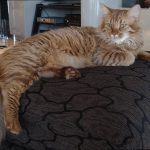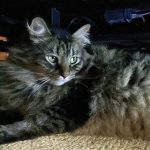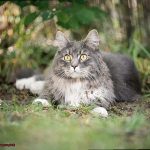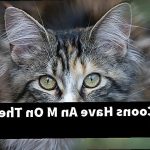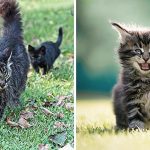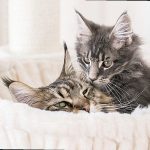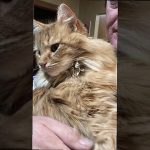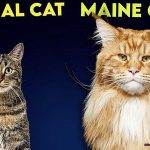Are you the proud parent of a majestic Maine Coon? Do you find yourself scratching your head, wondering how often to feed your feline friend? If so, don’t fret. You’re not alone in this struggle. As one of the largest domesticated cat breeds, Maine Coons have an insatiable appetite. However, overfeeding can lead to obesity and other health issues, making it crucial to get their feeding schedule just right.
In this blog post, we’ll explore the optimal number of meals for Maine Coons per day while taking into account their nutritional needs and eating habits. We’ll also stress the importance of a well-balanced diet that ensures your furry companion stays healthy and happy.
Did you know that Maine Coons don’t chow down like typical cats? They prefer to graze on several small meals throughout the day instead of two larger ones. Understanding your Maine Coon’s unique feeding habits is vital for providing them with proper care.
Stay tuned as we delve deeper into how frequently you should feed your Maine Coon, how much food they require per meal and common mistakes to avoid. With our expert tips and tricks, you’ll be able to keep your beloved pet purring with satisfaction while safeguarding their health from overindulgence.
What is a Maine Coon?
With their long, shaggy fur, tufted ears, and bushy tails, these cats are a sight to behold. But there’s more to them than just their appearance.
Maine Coons were once used as working cats on farms and ships, where they honed their hunting skills. Today, they are beloved pets known for their gentle nature and affectionate personalities. These cats love human company and thrive in families with children and other pets.
One of the most defining features of Maine Coons is their size. They are considered one of the largest domestic cat breeds, with males weighing between 13-18 pounds and females between 8-12 pounds. Their muscular build and rectangular-shaped body give them a regal appearance that is sure to impress.
But don’t let their size fool you; Maine Coons are friendly and sociable cats. They enjoy playing with toys that stimulate their hunting instincts and are known for being affectionate towards their owners. These cats are not shy about showing their love and will often follow their owners around the house.
When it comes to caring for a Maine Coon, it’s important to remember that they have big appetites. While they’re not picky eaters, it’s important to feed them a balanced diet that meets their nutritional needs. Overfeeding can lead to obesity and other health problems.
Why Do Maine Coons Need to Eat Regularly?
Maine Coons are not your average house cat. These majestic felines are larger than most domesticated breeds and have a unique history as working cats with exceptional hunting skills. Although they make wonderful pets, it’s important to remember that these big cats have big appetites that require a balanced diet to avoid health problems. As an expert in the field, let me tell you why Maine Coons need to eat regularly.
Firstly, their size requires them to consume a significant amount of food. Maine Coons are one of the largest domesticated cat breeds, and their active lifestyle means they need high levels of energy to maintain their activity levels. Skipping meals or leaving long gaps between meals can result in lethargy, weakness, and weight loss.
Moreover, Maine Coons have a higher metabolism than other cat breeds. This means that they burn calories faster and need more frequent meals to keep up with their energy needs. A lack of food can cause these majestic felines to become listless, inactive, and vulnerable to various health problems.
But that’s not all – Maine Coons also have thick fur that they shed throughout the year. When grooming themselves, they can ingest a lot of hair which can cause hairballs if not eliminated properly. Eating regularly ensures that their digestive system is functioning correctly and helps prevent blockages or impactions caused by hairballs.
Furthermore, Maine Coons are prone to urinary tract problems such as bladder stones or infections. Eating regularly ensures that the urine is diluted, reducing the likelihood of these problems occurring. A balanced diet is crucial for maintaining your feline’s overall well-being.
So what should you feed your Maine Coon? A high-quality diet rich in protein is essential for maintaining their muscle mass and energy levels. Canned or wet food can provide a good source of hydration, which is vital for preventing urinary tract issues.
What Is the Ideal Feeding Schedule for Maine Coons?
Maine Coons are majestic felines with a reputation for their hearty appetite and large size. As an expert in Maine Coon nutrition, I understand the importance of establishing an ideal feeding schedule that caters to their unique needs, while also preventing obesity and related health issues.
When it comes to feeding your Maine Coon, their age, weight, and activity level are crucial factors to consider. Adult Maine Coons generally require two meals a day, while kittens may need up to four meals a day to meet their growing nutritional needs.
However, due to their predisposition to obesity, it’s important to avoid overfeeding your Maine Coon. A recommended approach is to feed them smaller portions more frequently throughout the day, which can also establish a routine and prevent begging behavior.
Hydration is another vital aspect of their diet, as Maine Coons have a natural tendency to drink plenty of water. Therefore, it’s essential to provide fresh water at all times and even invest in a water fountain to encourage more water consumption.
To summarize, the ideal feeding schedule for Maine Coons is best determined by consulting with a veterinarian or animal nutritionist and tailoring it to their individual needs. By feeding them smaller portions more frequently and ensuring they have access to fresh water, you’ll be promoting their overall health and well-being. Here are some key takeaways:
How Much Food Should a Maine Coon Eat Per Day?
These felines are known for their big appetites and larger-than-life personalities. But when it comes to their diet, how much food should they be consuming each day? As an expert in Maine Coon nutrition, let me guide you through the ins and outs of feeding your furry friend.
Feeding frequency is the first thing to consider. As kittens, Maine Coons require more frequent meals – approximately 3-4 times per day – to support their rapid growth and development. As they mature into adulthood, they can usually transition to 2-3 meals per day.
Now let’s talk about portion sizes. The amount of food your Maine Coon should eat per day depends on their weight and activity level. On average, a healthy adult Maine Coon should consume about 20-30 calories per pound of body weight daily. For example, if your Maine Coon weighs 15 pounds, they should be consuming between 300-450 calories per day.
Choosing high-quality cat food that is specifically formulated for Maine Coons or large breed cats is crucial. These foods will have the appropriate balance of nutrients and calories to support your cat’s unique needs. Be sure to check the ingredients label and avoid foods that contain fillers or artificial preservatives.
One of the most important things to keep in mind is not to overfeed your Maine Coon. Overfeeding can lead to obesity and other health problems that could potentially shorten your cat’s lifespan. It’s essential to monitor your cat’s weight and adjust their food intake accordingly.
Factors to Consider When Determining Feeding Amounts and Frequency
However, determining the right amount of food and frequency for your pet can be tricky, given their size and voracious appetite. There are several factors you need to consider when deciding on feeding amounts and frequency for your Maine Coon.
Firstly, you should pay attention to your cat’s age and weight. Kittens require more frequent feedings than adult cats because they are still growing and therefore need more nutrients to support their development. Once they become adults, the frequency of feeding can be reduced, but the portion sizes may need to be adjusted based on their weight.
Secondly, the activity level of your cat is an important factor to consider. Maine Coons are known for their playful and active nature, which means that they need more calories and nutrients to maintain their energy levels. If your cat is constantly on the move, they will need more food than one that is less active.
Thirdly, the type of food you are feeding your cat is crucial. High-quality, protein-rich foods provide Maine Coons with the necessary nutrients they need to maintain their health and energy levels. A well-balanced diet consisting of a mix of wet and dry food is recommended.
Lastly, monitoring your cat’s weight is essential. Overfeeding can lead to obesity and other health issues in Maine Coons. Therefore, it is important to measure out their portions and avoid free-feeding.
What Type of Food Should I Feed My Maine Coon?
Maine Coons are known for their massive size, fluffy coats, and charming personalities. But have you ever wondered what type of food is best for these gentle giants? As an expert in feline nutrition, I can tell you that feeding your Maine Coon a high-quality, protein-rich diet is crucial to their overall health.
To meet their nutritional needs, it’s recommended to opt for food that is specifically formulated for Maine Coons or large-breed cats. This ensures that they receive the appropriate balance of nutrients that their unique bodies require. Additionally, wet or canned food should be the primary source of their diet as it helps with hydration and prevents urinary tract problems. Who doesn’t love extra gravy in their diet?
While dry food can be given as a supplement or treat, it should not be the main source of their diet. Feeding them exclusively dry food can lead to health problems such as obesity and dental issues.
As tempting as it may be to share your meal with your feline friend, it’s important to avoid feeding them human food or table scraps. These foods can upset their stomach and cause serious health issues. Stick to cat-specific food to ensure they receive all necessary nutrients.
Don’t forget the importance of providing fresh water for your Maine Coon to drink. Keep their water bowl full and monitor their water intake to ensure proper hydration.
Consulting with your veterinarian is always a smart move when determining the appropriate portion size and feeding schedule for your cat. Factors such as age, weight, and activity level should be taken into account when developing a feeding plan.
Tips for Feeding Your Maine Coon
Maine Coons are known for their big appetite and love for food, but overfeeding them can have serious consequences such as obesity and other health problems.
One of the most crucial tips for feeding your Maine Coon is to choose high-quality cat food. Look for brands that use real meat as the primary ingredient and avoid those that contain fillers like corn or wheat. These fillers can pose a risk to your cat’s health and may not provide the necessary nutrients they need.
Feeding your Maine Coon at specific times of the day is another important tip to keep in mind. Adult Maine Coons should be fed twice a day, while kittens may require three to four smaller meals. This will help prevent overeating and ensure that your cat is getting the proper nutrition they need.
Measuring your cat’s food is also an essential part of feeding your Maine Coon. Follow the feeding guidelines on the cat food packaging or consult with your veterinarian to determine the appropriate amount of food for your cat. This will not only prevent overfeeding but also help keep your cat at a healthy weight.
Providing fresh water is another important aspect of feeding your Maine Coon. Make sure they have access to clean water at all times and clean their water bowl regularly to prevent bacteria growth. Dehydration can cause serious health problems in cats, so it’s important to make sure they are drinking enough water.
Lastly, avoid table scraps when feeding your Maine Coon. Human food can be harmful to their health and lead to obesity, digestive issues, and other health problems. Stick to high-quality cat food and treats specifically designed for cats.
Conclusion
To sum up, taking care of your Maine Coon’s dietary needs is crucial for their overall health and well-being. As a larger breed, they require a balanced diet and specific feeding schedule to maintain their unique appetite. Overfeeding can lead to obesity and other health problems, so it’s essential to be mindful of portion sizes.
Understanding your Maine Coon’s eating habits is key in establishing an ideal feeding schedule that caters to their individual needs. Grazing on several small meals throughout the day instead of two larger ones is common among Maine Coons. Providing fresh water at all times and choosing high-quality cat food specifically formulated for large-breed cats or Maine Coons is also important.
Factors such as age, weight, activity level, and type of food should be considered when determining the appropriate portion size and feeding frequency for your feline friend. Consulting with a veterinarian or animal nutritionist can provide valuable insights into developing a feeding plan that promotes optimal health.
To ensure your Maine Coon stays healthy, measure their food portions, avoid table scraps or human food, and keep their water bowl clean and full.
